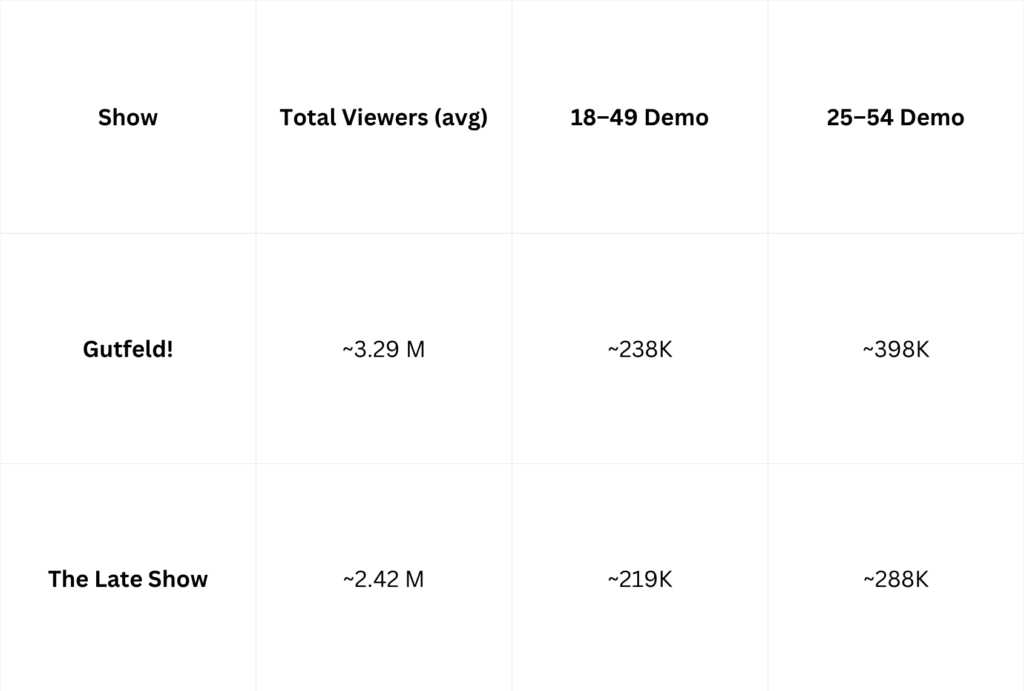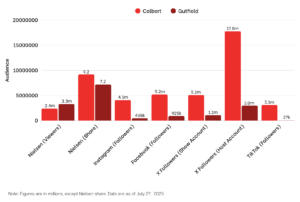When news broke that CBS was canceling “The Late Show With Stephen Colbert,” Fox News wasted no time declaring victory. According to their spin, Colbert wasn’t just getting axed — he was being dethroned by their own 10 p.m. star, Greg Gutfeld, who they proudly proclaimed the “ratings king of late night.”
Gutfeld, who has been dubbed the “Jon Stewart of right-wing comedy,” has become a symbol of what some are calling a new era in political humor, one where political satire, historically the domain of the progressive left, now punches from the right.
Of course, it’s entirely possible you’ve never heard of Gutfeld unless you watch Fox News. But that doesn’t mean his influence is negligible. Gutfeld’s rise marks a rightward shift in mainstream political comedy. His show doesn’t just fill a gap for conservative viewers who’ve long felt alienated by liberal-leaning satire; it also reflects a broader cultural turn, where punchlines with a populist, right-wing and often combative edge are echoing far beyond the alt-right corners of the internet.
But does that mean that Gutfeld is really the future of late-night? Has his conservative brand of ironic humor replaced that of comedians like Colbert?
The answer is: Not by a mile.
Despite being the most successful right-wing political comic on television, Gutfeld has never come close to matching the reach or influence of Colbert. Frankly, the comparison is laughable — especially when the primary evidence cited in Gutfeld’s favor is Nielsen ratings.
Despite being the most successful right-wing political comic on television, Gutfeld has never come close to matching the reach or influence of Colbert. Frankly, the comparison is laughable — especially when the primary evidence cited in Gutfeld’s favor is Nielsen ratings.
If we’re going to accurately measure a comedian’s cultural force, we need more than just raw viewership numbers. True influence comes from a blend of metrics — quantitative (ratings, social media followers, YouTube views) and qualitative (cultural relevance, viral moments, awards, critical reception).
By any comprehensive standard, Gutfeld simply doesn’t stack up. He reaches a smaller, more insular audience. His presence in public discourse is far more limited. And most importantly, his comedy lacks the sharpness, originality and resonance that make Colbert’s work not just popular, but iconic.
The Math
On a clip that aired shortly after the CBS cancellation announcement, Gutfeld gloated that his Nielsen ratings were higher than Colbert’s, a fact that has been endlessly repeated as purported “proof” that Colbert’s was a dying brand. Smugly, Gutfeld noted that “Math is what happens to other people.”
So let’s take a moment and do some math, because the numbers reveal Gutfeld’s claim that he dominates Colbert is false by almost every metric. In fact, the only metric where Gutfeld can claim to outshine Colbert — the Nielsen ratings — is possibly the least socially significant one, given a media environment where fewer and fewer viewers watch political comedy on televisions.
As far as Nielsen viewer statistics go, the results for the two shows are not really that different when we account for the fact that they air at drastically different times (Colbert starts at 11:35 p.m.; Gutfeld at 10 p.m.), and that Gutfeld has literally no market competition as the only conservative late-night comedy host. Colbert, in comparison, airs against both Jimmy Kimmel and Jimmy Fallon, thereby dividing a like-minded market.

Here’s the other thing. Gutfeld might get a higher number of viewers according to Nielsen, but Colbert tops him in the average share of the viewer market. Nielsen tracks two types of data: Viewers (the total number of sets tuned in) and share (the percentage of households watching television at a specific time.) When we compare market share, Gutfeld gets 7.16, less than Colbert’s 9.2 — again, this is even more noteworthy because the market size is much smaller at 11:35 p.m. than at 10 p.m.
But — and this fact is critical — Nielsen ratings account for only a small part of total viewer numbers. Take, for example, YouTube, where many viewers see these shows either as clips or in their entirety. On that platform, “The Late Show With Stephen Colbert” has 10.1 million subscribers, and clips of his opening monologues regularly get around 2.5 million views. Meanwhile, the entire Fox News network has just over 14 million subscribers on YouTube. Clips from “Gutfeld!” tend to average about 500,000 views on a good day, a consistent five times less than those watching Colbert’s monologues.
As you can see from this chart, Colbert’s audiences dwarf Gutfeld’s across every major electronic media platform. Colbert’s show has four times more followers on X (a platform on which the show has stopped posting new material), almost six times more on Facebook, eight times more on Instagram and an astonishing 115 times more followers on TikTok.
 (Chart by Salon / Data from Sophia A. McClennen & Christopher Zorn)The Impact
(Chart by Salon / Data from Sophia A. McClennen & Christopher Zorn)The Impact
Numbers are a valuable metric to help us track impact, but they don’t tell the whole story. We need to also pay attention to the extent to which a comedian influences how people think about issues, how they shape public discourse and how they influence the art of comedy.
There is not one example of Gutfeld influencing the public lexicon, changing political views, educating his viewers or engaging in the types of crossover events for which Colbert has been famous. Colbert coined new words, gave an iconic performance at the 2006 White House Correspondents Association dinner in front of then-President George W. Bush, performed on the National Mall, testified before Congress, started a Super PAC, ran for president (twice), regularly interviewed candidates and politicians on both sides of the aisle, and has been discussed incessantly in both liberal and conservative media.
Want more sharp takes on politics? Sign up for our free newsletter, Standing Room Only, written by Amanda Marcotte, now also a weekly show on YouTube or wherever you get your podcasts.
Meanwhile, Gutfeld has not done a single one of these things. Thus far, the most noteworthy elements of his career have resulted from insensitive or derogatory comments. In one of his most “famous” moments, he claimed that Kyle Rittenhouse did the “right thing” when the then-teenager shot and killed two men and wounded another during the August 2020 protests over the police shooting of Jacob Blake in Kenosha, Wisc. (Rittenhouse pleaded self-defense and was acquitted in November 2021.) Besides there being nothing remotely related to comedy in his statement, Gutfeld’s remark underscores how his brand is almost entirely built on bile, bite and snark — a combination, for what it’s worth, that basically describes every right-wing media influencer out there.
Colbert, in contrast, became famous after creating one of the most socially significant satirical characters in U.S. history — the persona he played on “The Colbert Report.” During his run on “The Late Show,” he has further honed his craft to regularly use ironic wit to not just entertain his audiences, but also to get them to think differently about pressing social issues. His comedy frequently makes the news because it regularly affects how the public thinks. Gutfeld has no comparable examples.
A search of “Fox News” and “Stephen Colbert” for the past year on Google yields over 15 million hits. A search of “Fox News” and “Greg Gutfeld” for the past year yields 808,000 hits. Gutfeld’s own network mentions Colbert more often than their own host.
The Comedy
If you haven’t, watch a clip of “Gutfeld!” You will immediately notice that his jokes often get nothing more than a cringey, forced laugh from his audience. Now, to be fair, his studio audience has little in common with that inside the Ed Sullivan Theater where Colbert tapes his show. But live audience size aside, Gutfeld’s jokes don’t get laughs during tapings because, well, they just aren’t that funny.
After “Gutfeld!” first aired, Variety’s chief correspondent Daniel D’Addario noted that Gutfield’s comedy is almost totally dependent on mean wisecracks that lack comedic art: “Cruelty is all Gutfeld has at his disposal. He has no affirmative argument for why one should watch his show.” D’Addario argued that what makes the show stand out is not its sense of humor but, rather, its unfiltered, biting jabs: “Even by the standards of the network it’s on, this is a nasty, unappealing thing.”
Gutfeld is often referred to as a right-wing satirist — despite the fact that his comedy rarely meets the standards of actual satire, which depends on a creative use of irony. Right-wing audiences regularly confuse insult comedy with ironic satire but, as I’ve argued, saying something s****y and then laughing, isn’t comedy: It’s just being a jerk.
We need your help to stay independent
But the real problem with Gutfeld’s comedy is that he tries to offer zingers to versions of reality he has entirely fabricated, like his crack about math being what happens to other people. Take, for another example, this line from the opening monologue of his debut on “Gutfeld!”: “As for those late-night shows we’re supposed to compete against — why bother? Who do they offend?” Gutfeld asked. “The only time Stephen Colbert ruffles feathers is in a pillow fight.” That’s a pretty odd statement, considering Trump himself has had his feathers ruffled plenty of times by Colbert, so much so that the president celebrated the idea that Colbert’s show would be cancelled.
The point is that Colbert bothered Trump because his unique form of satire was able to redefine the president for the public, making it easier to understand an autocrat who is at once absurd and ridiculous, but also terrifying and megalomaniacal. His witty use of irony on “The Late Show” — where he uses humor to help his audience better understand reality — ensures he will remain an American comedic legend. Colbert’s comedy offers a masterclass in layered satire: He blends sharp political critique, intellectual wit and performative irony in an effort to hold power accountable while keeping his audience laughing.
In contrast, Gutfeld’s most successful moments have been marked by a crude, jarring style that reinforces the power elite, stokes right-wing populism and justifies social inequality. Most importantly, his work commits the unforgivable comedic sin: While it may pack a mean punch, it is, ultimately, entirely forgettable.
Read more
about this topic


